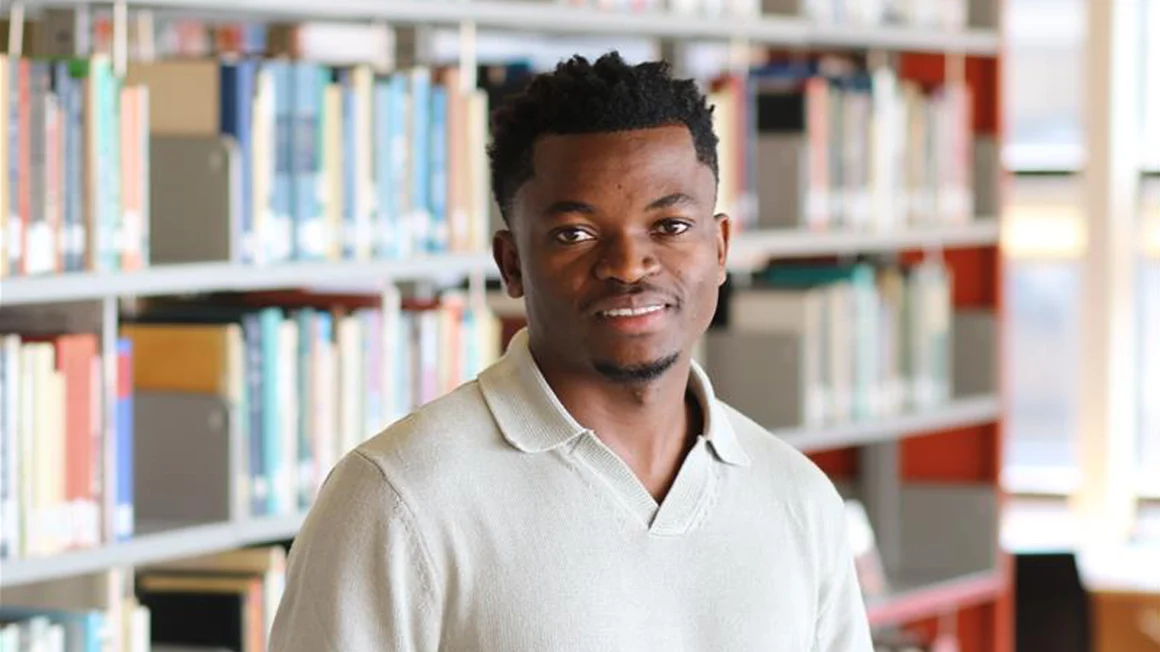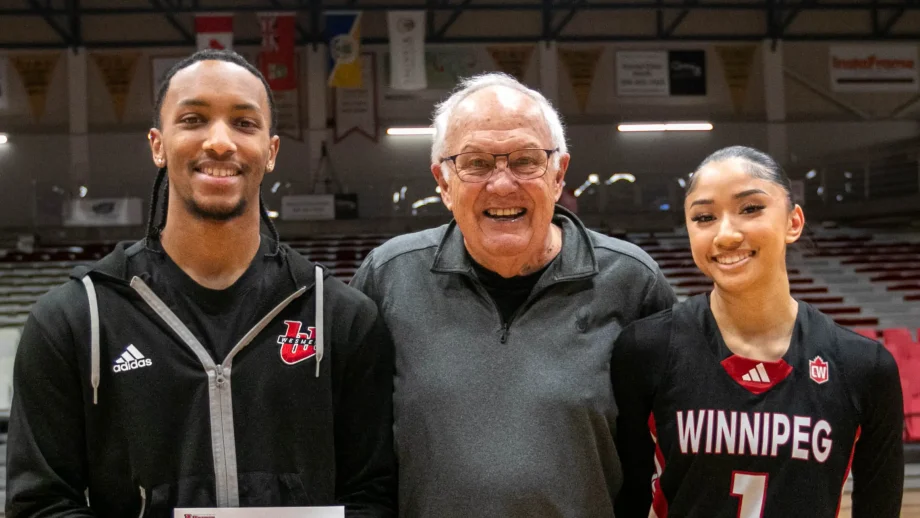Modeste Katotoka (BSc [Hons] 25) has a passion for physics, and understanding the mechanics of how things work. Curious and motivated, Katotoka, at the age of 10, successfully built his family a home theatre using a jerrycan, old radio speakers, and the family television.
This past June, this inventor graduated with Bachelor of Science in medical physics and accumulated two Natural Sciences and Engineering Research Council of Canada (NSERC) Undergraduate Student Research Awards (USRA) and a Canadian Institute of Health Research (CIHR) Undergraduate Student Research Award totaling over $30,000.
That situation defined who I am today. The moment I saw those CT scans, that was a turning point for my career and path of study.
Modeste Katotoka
Originally from Congo, arriving as a refugee in Winnipeg, he began his academic path at UWinnipeg in 2018. Inspired by the movie, Gifted Hands, a biographical film about Dr. Ben Carson, Katotoka wanted to become a neurosurgeon, and enrolled in the biochemistry program.
As an introvert, and new to campus, Katotoka felt isolated and found biochemistry challenging.
“I was feeling a bit lost, the path was not clear how to get from A to Z,” shared Katotoka. “I was not talking to people; I was not talking to professors.”
Change in direction
Then in 2021, Katotoka’s path took a dramatic turn when his father tragically died of a stroke. This misfortune gave him clarity for a new path when he saw his father’s brain scan at the hospital.
“That situation defined who I am today,” said Katotoka. “The moment I saw those CT scans, that was a turning point for my career and path of study.”
The CT scans reminded Katotoka of his affinity for physics and understanding mechanics and how things work. He made the decision to leave the biochemistry program, and he began his quest to study physics.
He started at UWinnipeg’s Department of Physics talking to Andrea Wiebe, the office assistant. Wiebe sorted Katotoka out by answering his questions and offering him a few suggestions. This allowed Katotoka to begin his physics journey taking a few classes in the fall, after his father’s death.
Finding his way in physics
In one of his classes, mathematical physics, he encountered professor Dr. Dwight Vincent. Dr. Vincent suggested he compete in the international University Physics Competition (UPC). Katotoka, inspired by the idea, built the three-person team to compete with a fellow physics student and a colleague from neuroscience.
“Our UPC task was to analyze a scenario using principles of physics and write a solution within 48 hours,” explained Katotoka. “We were assigned to calculate the time a spacecraft sent from Earth would take to deflect the destructive course of an asteroid accelerating directly toward Earth.”
During this time, he was exposed to new physics tools such as MAPLE software, MATLAB, and LaTeX, which he had to learn and use on the fly. His team earned the recognition of the Accomplished Competitor.
The UPC competition and his initial encouragement of Dr. Vincent set Katotoka sailing in the right direction.
Research opportunities opens doors
Since his experience with Dr. Vincent, Katotoka continued to make connections with other professors, including Dr. Melanie Martin in physics. That conversation led to him to working with UWinnipeg chemist Dr. Jamie Ritch and his first (NSERC) Undergraduate Student Research Award (USRA) in the summer of 2023.
Katotoka’s background in biochemistry helped him with is research, and the project trained him to use nuclear magnetic resonance (NMR) and infrared (IR) spectroscopy to check the purity of the compounds.
“My early years as a chemistry student were beneficial to this unique learning experience,” shared Katotoka. “Conducting research with Dr. Ritch and being part of his lab was a significant experience that taught me invaluable skills and significantly contributed to my academic and personal growth.”
While taking a quantum mechanics class with Dr. Jeff Martin, Canada Research Chair (Tier 1) in Fundamental Symmetries in Subatomic Physics, Katotoka asked Dr. J. Martin if there were any opportunities to work with him.
This conversation, and his good grades, led to the recruitment of Katotoka for a second NSERC Undergraduate Student Research Award working with Dr. J. Martin and working at TRIUMF, one of the world’s leading subatomic physics research centres in Vancouver, BC.
Katotoka worked with Dr. J. Martin on the TRIUMF Ultracold Advanced Neutron (TUCAN) project preparing an experiment to precisely measure the neutron electric dipole moment (EDM).
“My role in this research was to develop, fabricate, and construct a set of correction coils that would be used to provide a very constant magnetic field environment.”
Katotoka spent the summer of 2024 in Vancouver, fabricating these coils and building a program to control them and test their operation. These prototype coils have since been installed inside the $4 million magnetically shielded room (MSR), which provides a magnetically quiet environment for this experiment.
This past summer, Katotoka received a Canadian Institute of Health Research (CIHR) Undergraduate Student Research Award working with Dr. J. Martin exploring subatomic techniques that apply in medical physics as well as to the UCN experiment.
“I studied these coils in a series of tests aimed at controlling the magnetic field very precisely,” explained Katotoka. “I was responsible for the operation of this coil system for experiments and analyzing the measured field data.”
This fall, Katotoka begins his master’s in medical physics at UManitoba.
“It has been rewarding watching Modeste develop his science and research skills through funding from two NSERC USRAs and one CIHR USRA with my colleagues,” shared Dr. M. Martin. “I’m looking forward to the day he becomes my colleague as a medical physicist in Manitoba when he will be helping our healthcare system.”
The University of Winnipeg has a distinguished history of providing high-quality research and training opportunities for both undergraduate and graduate students through various funding and development programs. If you are interested in learning more about these opportunities, please contact Dylan Jones at d.jones@uwinnipeg.ca and/or visit the Resources for Students webpage.





